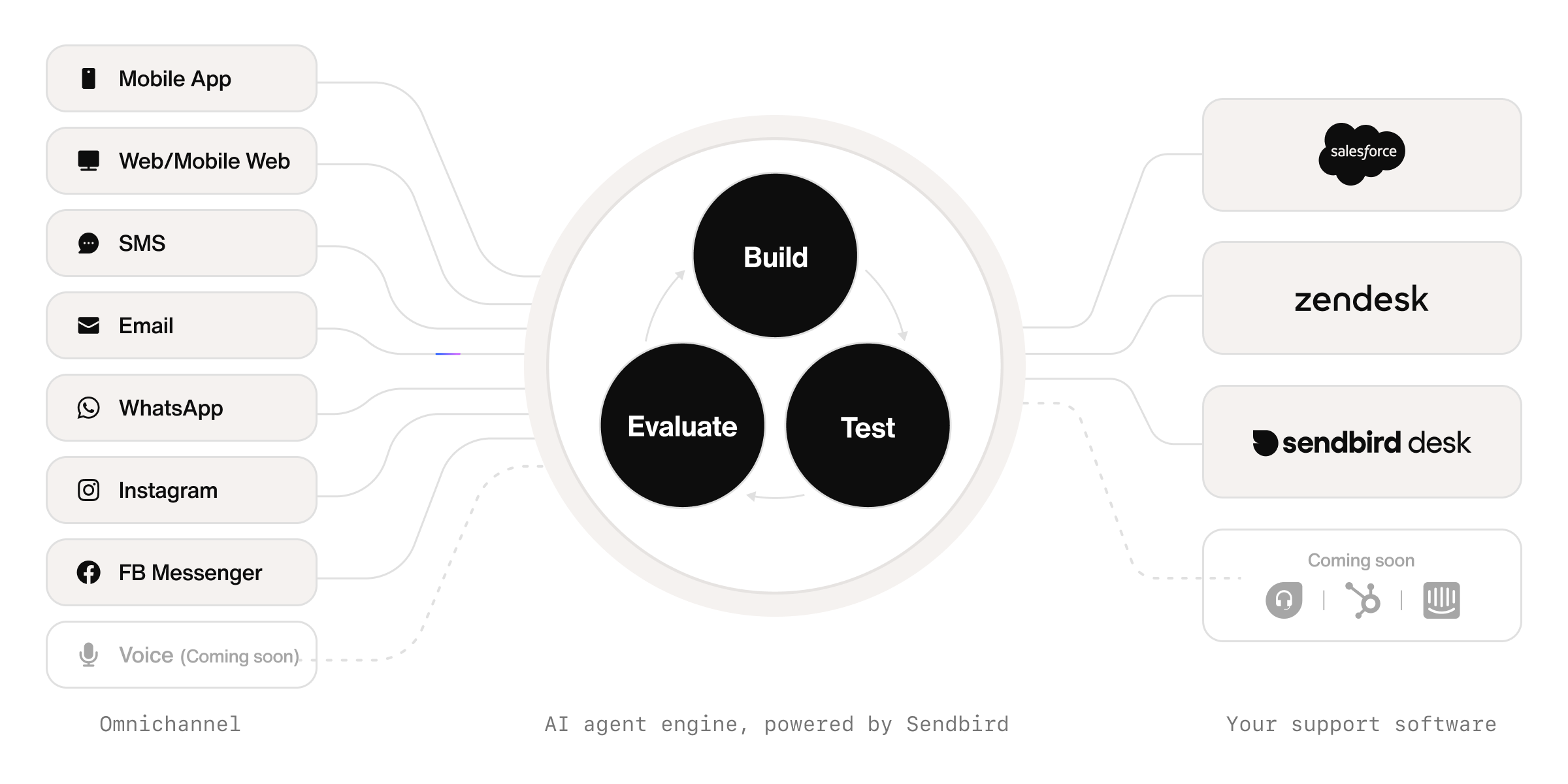AI in customer service: The best use cases, tools, and best practices for 2025

AI is transforming industries across the board, but its impact is most immediate and sweeping in customer service. According to Gartner, 85% of service leaders plan to use AI by 2025. Meanwhile, according to surveyed service leaders, 100% of future service interactions will involve AI in some form.
By automating routine tasks, assisting human agents, scaling personalized experiences, and enabling truly seamless 24/7 omnichannel support—AI enables customer service teams to provide faster, more efficient, more satisfying support—all at a fraction of the cost.
In short, AI is raising the bar on efficiency and customer experience, and so rapidly becoming a must-have in competitive customer service operations.
This article explores the ins and outs of AI in customer service to help you understand this new technology, its benefits, and how to use it to dramatically improve your customer support.

Anywhere, anytime AI customer support
Understanding AI in customer service in 2025
AI in customer service is about using artificial intelligence (AI) technology to perform tasks that typically require human intelligence. AI-driven systems are designed to understand, learn from, and respond to customer inquiries 24/7 in a way that imitates human interaction, freeing human agents to focus on more complex tasks.

By integrating AI for customer service with core service functions, a business can improve its response times, streamline workflows, reduce operational costs, and provide the next generation of personalized experiences at scale.

Harness proactive AI customer support
AI in customer service: From reactive to proactive
In recent years, generative AI chatbots have been one of the most visible examples of AI in customer service. These conversational AI tools use NLP to understand the intent behind customer messages and respond with relevant solutions pulled from their knowledge base.
AI agents are the next generation of chatbots. These autonomous entities reason, use tools, and perform actions on behalf of other systems in pursuit of the goals set for them. They can access real-time data, maintain context between interactions, and integrate across support channels and systems. Acting as a bridge between systems, agents can intelligently resolve complex multi-step issues from start to finish, remember past customer interactions, and deliver more personalized experiences that elevate the customer experience.
In effect, AI agents are more than just conversational tools—they’re independent, proactive problem solvers. Instead of simply answering FAQs or routing customers, an AI agent can take multiple actions to automate various support workflows. For example, they can check an order status, update account information, initiate refunds, trigger subscription upsells, or troubleshoot multi-step IT issues—all without human intervention.
AI agents shift AI customer service from reactive to proactive, while automating more complex workflows and assisting human agents to improve efficiency and customer experience.
Learn more: AI agent vs chatbot: What’s the difference?
9 ways to use AI in customer service
AI in customer service isn’t new, but many organizations are still experimenting with how to implement it effectively. Here are some examples of how to use AI customer support in your business.
1. Adopt AI agents
Like chatbots on steroids, AI agents use NLP to understand and resolve complex customer issues, but also proactively call on real-time data and tools to handle entire inquiries from start to finish. AI agents are trained on real customer service interactions and relevant business data, but also learn and adapt based on experiences, so their responses and solutions get more accurate and relevant over time.
AI agents also remember past interactions with customers, enabling them to maintain context and pick up where they left off, regardless of the channel. This adds a welcome dose of continuity to the support experience, creating seamless interactions that lead to faster resolution times and greater customer satisfaction.
Learn more: How to build an AI agent: The 8 key steps
2. Automate workflows
AI in customer service can automate an increasing range of routine workflows, helping to scale support operations, provide faster customer support, and increase the efficiency of human agents. In fact, 64% of service leaders say that AI helps reduce the amount of time customer service reps spend resolving tickets.
Here are a few ways to automate and optimize workflows with AI customer care:
AI-based ticket routing systems can analyze incoming queries and route them to the right agent based on customer intent, sentiment, or urgency.
Automatically summarize tickets for human agents to save time spent reading through conversation histories.
Automate conversation follow-ups across channels with content personalized based on current conversation, prior interactions, and other contexts.
Learn more: AI workflow automation: A guide for 2025
3. Proactive engagement
AI concierges can anticipate customer needs by analyzing behavioral data, real-time context, and interaction history to offer timely, tailored assistance before they reach out. By proactively resolving issues, an AI concierge helps to nip issues in the bud, reduce churn, and elevate customer satisfaction.
For example, an AI agent can alert customers of service outages, remind them of upcoming appointments, or inform them it's almost time to renew their subscription. What’s more, the AI agent can also answer service-related questions from customers, book appointments, or process transactions in full. By understanding the needs of customers and acting in real time, AI in customer service can reduce churn, reduce ticket volume, and elevate the customer experience.
4. Deploy intelligent personalization
AI agents can proactively personalize interactions with customers across channels by analyzing historical customer data as well as current context to deliver tailored support that feels more human and relevant. This real-time personalization helps to engage customers at risk of churning, but also drive revenue by suggesting relevant upsells and cross-sells during support interactions.
For example, an AI agent can proactively trigger a personalized offer to upgrade their service based on current conversational context and purchase history. And taking it to the next level, the AI agentic workflow can handle the exchange of payment info, confirm payment details, and then process the transaction—all without human assistance

5. Improve human efficiency and productivity
AI agents for customer service can serve as virtual assistants, enhancing the productivity and efficiency of human agents to achieve the best support outcomes. In fact, research shows that AI-powered virtual assistants can increase productivity by 14% for support agents.
For example, AI-powered assistants can help support teams navigate issues with ease and confidence, surfacing the most appropriate resources from knowledge bases. AI can also pull from customers’ contracts, warranties, purchase history, and other data to guide reps on the best course of action. This helps ensure consistency in each customer interaction, while reducing search times and thereby reducing handle times.
Other uses for copilots include:
AI employee onboarding: Virtual assistants can guide onboarding processes for employees, streamlining operations while ensuring consistency.
AI-powered search: Uses retrieval augmented generation (RAG) to extract information from knowledge bases, tickets, or conversations across the organization to ensure the most accurate human responses.
6. Enhance your help center
Most customers prefer to use self-service resources like FAQ pages and knowledge bases to resolve basic issues before they contact support. By integrating AI agents into websites and self-service solutions, businesses can present customers with the most relevant answers and solutions, helping to reduce ticket volume, resolution time, and improve customer satisfaction.
Beyond offering 24/7 guidance through self-serve resources, generative AI-powered writing tools can help to optimize and scale your knowledge base by writing articles, modifying tone or content, or suggesting content gaps.

Automate customer service with AI agents
7. Optimize call management
When faced with a complex problem, 8 in 10 customers still prefer to make a phone call. Call center solutions and interactive voice response systems that incorporate AI customer service can:
Automatically write post-call summaries to reduce call wrap-up times for human agents.
Transcribe voice interactions automatically to help with agent training, identify recurring issues, and enhance call quality assurance (QA).
Score phone interactions using voice QA tools to highlight customers at risk of churning.
To reduce call volumes, AI agents can be integrated across all support channels—SMS, social, email, mobile app, website—and make a seamless handoff to humans if necessary.
8. Improve service quality with AI insights
AI in customer service can evaluate support conversations to reduce churn as part of quality assurance (QA) processes. Using NLP, voice analytics, and sentiment analysis, AI can analyze and review all conversations across channels and languages in seconds, helping teams to identify common pain points, patterns in customer complaints, and areas of improvement.
AI can also deliver targeted, actionable feedback for human agents based on business goals and customer needs to enhance coaching and streamline onboarding. By helping human reps to improve their support skills and performance, AI customer care leads to reduced handle times, resolution times, and improved CSAT scores.
9. Scale omnichannel customer service
AI agents for customer service are designed to handle high volumes of varied customer support requests in any language, helping to scale operations while ensuring consistent, timely, and satisfying customer interactions. Recent research shows that 86% of customer service leaders using AI say it improved their ability to scale operations while growing their company.
For example, by syncing conversations across channels, AI can start a conversation on WhatsApp and seamlessly switch to email if it better suits operations or customer preferences. AI agents also integrate omnichannel conversations into one 360° view of customers that helps with making smarter decisions.
Leading AI agent platforms like Sendbird make it easy to integrate AI agents across channels and customer service operations. They offer a foundation of enterprise-grade infrastructure that ensures AI security, scalability, and compliance without sacrificing performance.

Benefits of AI in customer service
Integrating AI into customer service operations offers major advantages for businesses and their customers. These benefits include:
Higher productivity: AI helps service teams to get more done faster. For instance, AI can be built directly into human agent workflows to enable AI workflow automation.
Greater efficiency: By automating routine inquiries and manual processes, AI helps to streamline customer service operations and reduce resolution times.
Better performance metrics: Businesses can achieve faster response and resolution times with AI agents that immediately and comprehensively respond to customers 24/7.
Greater customer satisfaction: AI makes support more accessible, responsive, and convenient for customers, helping to improve loyalty and CSAT scores.
Reduced costs: Businesses can do more with less by using AI for customer service automation for tedious, repetitive, and error-prone tasks.
Data insights: AI can process and leverage vast quantities of real-time data to identify trends, issues, and at-risk customers, driving better decisions with integrated data and a 360-degree view of customers.
Real-time personalization: AI agents can personalize interactions based on current context and past interactions to improve customer satisfaction and loyalty.
Less turnover: By handling repetitive tasks, AI eliminates much of the tedious, time-consuming work that drives up employee workloads and contributes to burnout and churn.

Boost CSAT with proactive AI customer service
Using AI in customer service in 2025
AI is revolutionizing how businesses interact with customers, allowing service teams to do more with less without falling short of ever-increasing customer expectations. With an AI agent platform for customer service, a business can streamline its support processes and improve efficiency with AI workflow automation.
If you’re looking to build AI agents for customer service, Sendbird can help.
Our robust AI agent platform makes it easy to build AI agents on a foundation of enterprise-grade infrastructure that ensures optimal performance with unmatched adaptability, scalability, or security.
If you want to learn more about the future of AI, you might enjoy these related resources:











